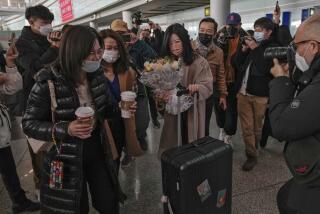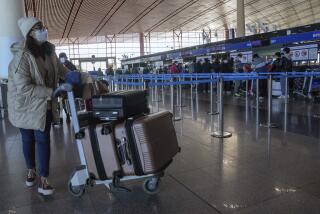Taking a hard line on H1N1 flu
- Share via
BEIJING — Chinese authorities tracked down Westwood resident Mike Su recently at a networking banquet in Beijing. They forced him to pack his bags, then whisked him away to a budget hotel on the edge of the city where they detained him for a week.
Su’s crime? On his flight from Los Angeles, the website director had the misfortune of sitting near someone who had allegedly contracted the H1N1 flu.
“I felt like I was going to prison,” said Su, 33. “I read the headlines in the news, but I never thought I’d be the guy who gets quarantined.”
The detention meant Su didn’t get a chance to strike deals in China for his company, Beverly Hills-based Break Media. He never exhibited any symptoms of the pandemic flu.
In the two months since the H1N1 flu first emerged, China continues to wield some of the toughest controls to combat the spread of the so-called swine flu. Those procedures include denying visas to travelers from countries where the virus is prevalent, screening airline passengers and enforcing quarantines. And although the effectiveness of these measures has yet to be ascertained, what’s clear is that stringent policies are disrupting business and travel. Foreign visitors are either postponing or canceling plans to visit China, fearful of getting snared by the flu dragnet.
Today, occupancy rates at Beijing’s five-star hotels stand at 48%, down 21 percentage points from a year ago and about 12 percentage points below expectations, said Guan Jianxin, a tourism industry analyst for Minzu Securities. He said it’s more than a slow economy.
“Hotel owners aren’t happy about these quarantine measures,” Guan said. “The high-end ones will be hit the hardest because they tend to receive the most international guests.”
Xu Feng, general manager of Beijing Dragon City, an online travel agency, said he’s had 20 cancellations in recent weeks by customers in the U.S., Europe and Australia.
“It’s getting worse,” Feng said. “All we can do is hope it’s temporary.”
Disembarking from some international flights in China has become a journey all its own. After landing, tourists are greeted by masked health officials draped in scrubs and ready to scan each passenger with a temperature gun. The process can take hours.
Despite the potential harm to business, China has defended its procedures. The country is still stung by the memory of Severe Acute Respiratory Syndrome, or SARS, which wreaked havoc on the population and business environment in 2003.
During the SARS virus outbreak, China was accused of hiding the severity of the disease and not reacting strongly enough. This time, criticism has been lobbed at Beijing for being too heavy-handed.
Authorities started detaining and quarantining any traveler with a Mexican passport in early May. That has stopped.
But they sequestered New Orleans Mayor C. Ray Nagin for five days in Shanghai last week after someone near him in economy class was suspected of having the virus.
The Chinese were unapologetic about detaining one of the best-known mayors in the United States. China, after all, has only 298 confirmed cases compared with the 17,855 in the U.S. as of Friday, and there have been no reported deaths here. That’s proof, some here say, that the tough measures are working.
The only whiff of impropriety about the Nagin detention discussed in the Chinese media was why a notable U.S. official would be traveling in coach.
Still, some travelers are staying put. Los Angeles attorney Frankie Leung was supposed to spend two weeks in China on a lecture tour. But he became skittish about traveling there as news of more quarantines surfaced. Friends in China warned him that his tight schedule could be spoiled by an unintended brush with the H1N1 flu.
“All you have to be is three rows in front of or behind someone on the plane suspected to have the flu and you’d have to be quarantined,” he said.
Leung nixed a trip that would have taken him to Shanghai, Beijing and Hong Kong. “I can’t afford to be in quarantine,” Leung said. “I don’t want to risk my time.”
It’s not just foreigners who are being scrutinized. Chinese nationals who return from countries with high numbers of H1N1 cases are being encouraged to quarantine themselves at home. Some are complying.
“I had one guy e-mail me to say ‘We can lunch now, I’m safe. I quarantined myself for seven days,” said James Zimmerman, an American attorney with Squire Sanders & Dempsey in Beijing. “We have clients coming over and our [Chinese] counterparts are asking them to stay in their hotel for seven days before we meet.”
According to the Beijing Municipal Health Bureau, authorities have quarantined 1,243 people as of Tuesday. About 1,000 of them have since been released. National figures are unavailable.
Many Western experts have already called China’s quarantining measures futile.
They recommend mitigation, which the U.S. has done by closing schools where breakouts have occurred.
“Countries have abandoned [quarantining] as they realize that containing the virus is impossible,” said Peter Cordingley, a spokesman for the World Health Organization.
Su, the website director, still laments his lost week in China. One moment he was staring at a purple sunset over Beijing. The next he was stuck in a dull suburban hotel room with a view of a brick smokestack.
Su breathlessly documented his quarantine on his blog, aproductguy.wordpress.com (whose server is blocked in China), and on Twitter. The days passed by slowly, often plugged by viewing copies of pirated DVDs supplied by sympathetic staff at the Westin. The air-conditioning was turned off to prevent the virus from spreading.
Su was scolded by a worker for serving himself at a buffet line. He could have passed on the flu, they said.
Friends and peers who were able to attend the tech conference that Su had been planning to attend contacted him on Skype, using the video device to offer encouragement.
Then at 7:10 p.m. Wednesday, seven days after his plane touched down in Shanghai, Su was released and headed back to L.A.
“I’ll try not to sit next to anyone sneezing,” he said.
--
Tommy Yang and Nicole Liu in the Times’ Beijing bureau contributed to this report.
More to Read
Sign up for The Wild
We’ll help you find the best places to hike, bike and run, as well as the perfect silent spots for meditation and yoga.
You may occasionally receive promotional content from the Los Angeles Times.







